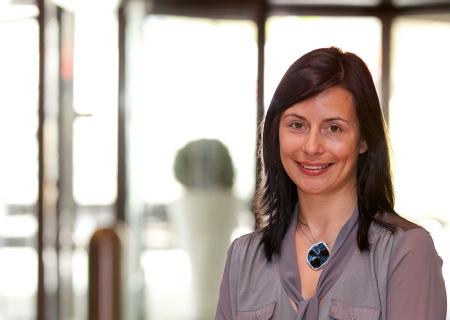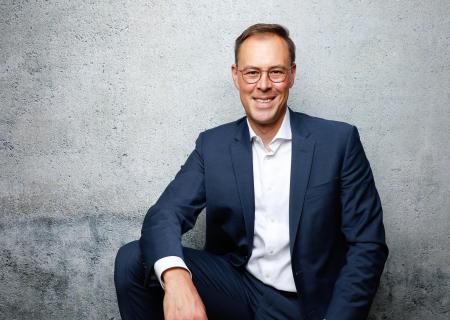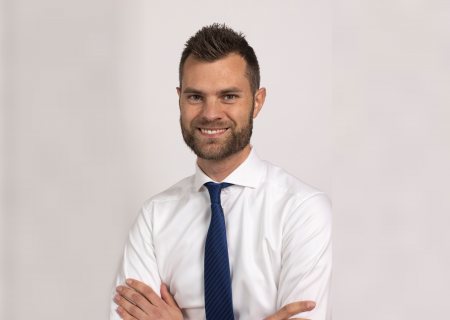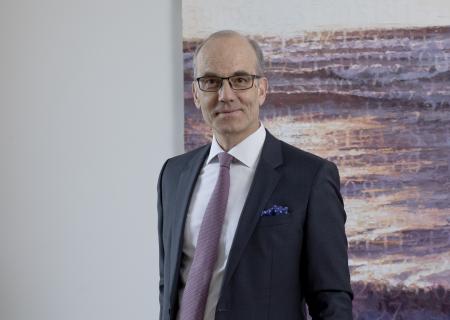Noel Manns
Principal Europa Capital
Noel Manns, a founder of Europa Capital and member of the INREV Management Board, recognised early on the benefits of INREV membership for his firm. IQ met up with him to hear how he got involved and what he thinks INREV’s biggest contributions to the industry have been to date.
“We’d just established Europa Capital and Judy Hill, [INREV’s first CEO] invited us along to an INREV conference in Vienna,” explains Manns. “I was very impressed by the breadth of people.”
Having been asked to suggest a suitable venue for delegates to meet for a drink, Manns recommended Vienna’s Sky Bar. “I met a lot of people there and that’s how I got involved. The people side is as important as the business side,” he adds.
Then comes an interesting observation: “A lot of people say they go to INREV events to meet investors. I don’t. But I do find it really useful to go to INREV events to meet other fund managers. Where else can I easily meet my competitors and discuss issues of mutual importance?”
I do find it really useful to go to INREV events to meet other fund managers.
According to Manns, one of INREV’s key contributions has been in providing a guiding hand. He talks about how, in the mid-90s, there was a commencement of interest in cross-border investing and the use of unlisted collective investments. “INREV was an organisation with generous representation from the main investing countries trying to put its arms around the industry and give it some form in a careful, interactive way.”
He highlights INREV’s role in setting the ground rules for areas such as reporting and style categorisation. He cites specific initiatives such as the Standard Data Delivery Sheet (SDDS) and the INREV Due Diligence Questionnaire, which he sees as vital in helping investors and potential investors understand what fund managers are doing and how their performance is measured.
“By chance, I believe we at Europa Capital were the first firm to use the INREV questionnaire. It helps investors whether, from Asia, America or Europe, understand the products we manage.”
Manns supports the idea that INREV’s key focus should be on investors “because the investors are ultimately the reason the industry exists.”
Meeting of minds
But he is also keen to stress that there’s a balance to strike. “There was a moment when INREV became too investor orientated,” he says.
There was an Investor Platform but some two thirds of the membership is made up of managers and Manns was in the vanguard of a move to introduce a forum for managers. It started off as a committee of those “who wanted to join” and has since “morphed” into something more formal.
The Investor Platform and the Fund Manager Forum now share some meetings, which Manns believes really benefits the organisation. They’re meetings where investors and fund managers discuss key topics such as alignment or fees or governance. “It’s a helpful interchange. We may all have very different views so it’s useful to discuss these things in a neutral, non-contentious environment where people can speak their mind.” This, he says, is the real prize.
There was a moment when INREV became too investor orientated.
One of the issues that is frequently aired is how to define an investor and a fund manager given that so many organisations increasingly perform both disciplines. It’s an important question.
On the campaign trail
Manns switches his attention to the equally significant issue of regulation. He suggests it’s an area where INREV’s contribution, though slightly late in coming, has already delivered impact and will continue to be essential for the future of the industry. “One of the really substantial changes in the evolution of INREV is its willingness to campaign in Brussels - to collate collective views and present them from the centre on behalf of the whole industry. It’s something fund managers have really appreciated and supported.” Manns acknowledges Brussels’ desire to focus on regulation postfinancial crisis, suggesting that there was probably too little control beforehand. However, he is quick to balance this with the widely held view that there is now a danger of overregulation.
He is also concerned that people who don’t fully understand the industry are responsible for regulating it. And he emphasises the cost implications. “Regulation will deliver lower returns because fund managers have had to put more resource into compliance and these costs have to be recovered somehow,” he says.
He is glad that INREV now has a “seat at the table” to represent the industry at a pan-European level. “Brussels should take account of the fact that INREV represents large sums of money and human capital across Europe. It’s not just the UK or Germany or the Netherlands or France moaning, it’s the whole industry. If you believe in one Europe then you should listen to a single European organisation.
Fit-for-purpose
Manns is open about the challenges that face the industry. Any boom, he says, attracts money and people “and then there’s a reckoning.”
In his view, there are probably too many fund managers and fewer funds with some managers struggling to raise new ones. Not all of the existing managers will be around in five to 10 years, but others will emerge. “That’s a healthy thing,” says Manns. “It’s a challenge but it’s what happens in a cycle.”
Fewer large investors are invested in funds. They want to do joint ventures and club deals. “We can incorporate those structures within the INREV world. But it’s important to preserve the fund offer because most investors are not big and they need the ability to go into pooled funds,” comments Manns. And he adds that INREV is a critical conduit of information for these smaller and medium sized investors helping them to understand how funds work.
Crystal clarity is the key, concludes Manns: “The labelling on the tin has to be clear so investors have confidence that they’re buying what they think they’re buying.”





